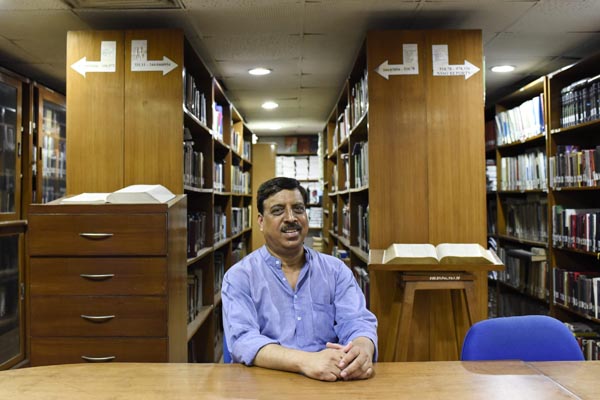The Untimely Demise of an Activist Extraordinaire
The Council for Social Development is deeply grieved by the untimely demise of Ambarish Rai, an extraordinary activist who spearheaded many movements for the cause of the marginalised and the under privileged. The sudden loss of such a dynamic, inspiring and compassionate leader who was at the heart of the right to education movement in India will leave a vacuum in the movement for the right to education and universalisation of education.
From its very inception in 2010, the secretariat of the Right to Education (RTE) Forum was located in the premises of CSD with Ambarish Rai the life force behind it. The linkage between the Forum and CSD was organic. In 2005, CSD used to host the PCCSS (People’s Campaign for Common School System), a network of social activists and educationists working towards the right to education through a common school system. Ambarish Rai was the convener of both the Forum and the PCCS which is why he will be remembered as one of the strongest advocates for a common school system and right to education in the country.

CSD’s association with Ambarish Rai was a long standing one; together we espoused the cause of right to education and the introduction of equitable education system in India. His presence touched everyone positively, his persona reflected a rare exuberance. While warm and deeply respectful to everyone his open admiration and gratitude to Professor Muchkund Dubey, President, Council for Social Development, himself an ardent advocate for the common school system, was particularly evident. Ambarish Rai used to cherish his meetings held with Prof. Dubey, inevitably over well-brewed coffee in India International Centre’s annexe lounge, as they would closely work out a template of the Forum’s activities to influence India’s education policy. In turn, Ambarish Rai also contributed immensely to the Council’s advocacy efforts in the area of education policy, developing a long-lasting synergy between the Forum and Council.
While he shared a close association with CSD’s senior faculty, he was also a popular figure in the Council’s rank and file. His outgoing, generous nature, smiling disposition, layered with his single minded devotion for equal education for all children, endeared him to all. He engaged closely with CSD’s academic, as well non-academic team, who often shared their concerns––personal, professional or political––with him. His response, sometimes providing new perspectives, was always immediate and positive. Ambarish Rai impacted the lives of whoever crossed his path. An unfailing potential of identifying the abilities of a person without focussing on their weaknesses was what made him take everyone along with him.
Ambarish Rai’s advocacy strategies were rigorous and deeply influential, constantly negotiating with the state for more accountability to ensure the right to education of every child. Annually this was marked by the Forum’s National Stocktaking Convention: an exercise that was attended typically by 800-1000 participants from all over the country. It was a programme to which CSD contributed wholeheartedly. Ambarish Rai was also involved closely to all the lectures and seminars organised by CSD.
Well before advocating the right to education, Ambarish Rai unfailingly stood for the powerless and downtrodden, and on various occasions effectively negotiated with the state making the rights of people a frontline issue. His activism began at a young age as the State General Secretary of All India Students Federation (AISF) in Uttar Pradesh (1977–1982) and then as National Secretary of AISF (1982-1986). During his student days, he was a popular leader, working tirelessly for the rights of students and the poverty stricken. This passion saw him get involved in the rights of workers, initially as President of the Uttar Pradesh Katai Mill Mazdoor Mahasangh (Spinning Mill Worker’s Union), a federation of workers’ union from 32 spinning mills that included state spinning mills as well cooperative spinning mills (1987-91). He was also President of the Eveready Flash Light Mazdoor Union, a worker’s union of the Eveready factory in Lucknow (1989-91).
His passion and leadership qualities were soon recognised and he was nominated Member, National Executive Committee of the All India Central Council of Trade Unions (AICCTU) (1989-91). His role in the trade union movement of the country was significant. His leadership role in movements like the UP Kisan Sabha in the 1990s was also noteworthy.
In early 2000, along with other educationists and networks, he started a massive campaign under the banner of National Alliance for the Fundamental Right to Education (NAFRE) and successfully gathered a crowd of about 40,000 people at Ramlila Maidan in New Delhi on 28 November, 2001 subsequently submitting a memorandum to the then Union Education Minister Kapil Sibal unequivocally demanding that education be recognised as a Fundamental Right. These efforts of mobilizing civil society and mass movements were among the catalysts that led to the 86th Constitutional Amendment in the Indian Constitution that made free and compulsory education a constitutional right. This impacted 25 million children in the country of which more than 10 Million children are girls. The Forum was subsequently formed collectively after the enactment of the RTE Act in 2009.
The endeavor of Ambarish Rai to ensure an equitable education system will be remembered by all those associated with the education sector, in India and globally. For us at CSD, a research institution that has been able to connect real time research and data with advocacy, the absence of Ambarish Rai, the country’s foremost education activist, will undoubtedly create a void. He will be irreplaceable, not only for the Council, but for all those who truly believe that a good, meaningful education is a right that should be given to each and every child.
CSD Family
Council for Social Development
New Delhi
